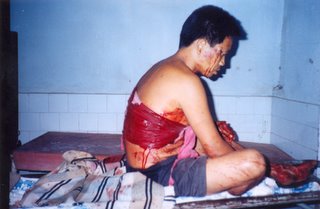Mahmudpur Katawa, Sultanpur District, UP
According to reports received, a pastor was arrested on charges of converting people; later on he was beaten in the local police station. The situation in Mahmudpur remains tense as Christians are increasingly under pressure.
Ram Prakash, a lay pastor in Sultanpur area in Uttar Pradesh was visiting Harish Chandra a Christian and his distant relative in a Dalit (Untouchable) colony on February 6th, 2004 when local High Caste Hindu leaders seized him. They were leading a mob of about 200 people. Accusing him of converting the locals they were roughing him up mercilessly when Harish Chandra took initiative, seized and locked up Ram Prakash inside his house in order to protect him.
The crowd then entered his house beating up both Harish Chandra and his wife. They misbehaved with the women in the home, and used abusive language against Christians. Meanwhile Ram Prakash called the police using his mobile phone, which was later taken away by the mob.
Soon the Police intervened and arrested Ram Prakash instead. He was taken to the local police station where he was detained on the pretext of investigation. According to reports received the Police Sub Inspector SI Anand Singh Thakur and three other constables beat him up mercilessly in the police station on the same night. They kept accusing him of being an American Agent and forced him to say "Jai Shri Ram!" (Victory be to Ram) and "Jai Mata Di" (Victory be to the goddess durga).
Ram Prakash was beaten up mercilessly and one can still see the wounds on his body. After he was released on Bail, a medical examination was done where in the doctors confirmed the injuries on his body. Meanwhile a false case has been made against Ram Prakash and he has been accused of spreading communal tension under section 151 of the Indian Penal Code (IPC). The local leaders who created all the trouble have not been arrested; the violence against Ram Prakash has been explained away as an outburst of an angry mob. When the correspondent spoke to the Police personnel he was told blankly that if Ram Prakash continues to proclaim Jesus in a Hindu environment this is bound to happen especially when a Hindutva wave is sweeping the country.
The High caste Hindu leaders have a lot of say in matters of local administration and the police, and it is believed by the Christians that Ram Prakash's arrest and then subsequent beating in the police lock up took place at the orders of the local Hindu leaders. This is the second incident against a Christian pastor in the Sultanpur district in less than two months.
Earlier on 25th December 2003 Hindutva Fundamentalists and local politicians had disrupted a Christian Meeting in Ramdaspur village. About 100 Christians were meeting in the house of a Christian when the police disrupted the meeting on the complaint of the Hindu Fundamentalist Groups. About eight Christians were charged with spreading communal tension under section 151 of the Indian Penal Code (IPC).
The person in whose house the meeting was held was arrested and the pastor who was conducting the meeting was threatened. The Local media briefed by the Fundamentalists had carried venomous articles against Christians, some of them against Pastor Ram Prakash even though he had not been associated with this incident.
It is a result of that negative propaganda that Ram Prakash is experiencing trouble now. He himself is from a Hindu background and came to know Jesus Christ a few years ago after getting healed of a mental sickness. Since then he has been conducting regular prayer meetings in his home, for which he has been constantly harassed. But if we have to understand what really is behind these outbursts we have to understand the context where all this has taken place.
Mahmudpur is a village where about 200 Thakur (High Caste Hindus) families and about 40 Dalit (Untouchable) families live. There has been a history of oppression by the Thakurs on the Dalits. Their women are raped, they are forced to work as labors for the Thakurs in their fields all the days of the week without getting paid adequately and the list goes on. With the coming of the Gospel however things have started to change.
As more and more Dalits embrace Christianity because they find their dignity restored in it, the Thakur community gets angrier primarily because of economic implications of the same. As Ram Prakash himself put it, "I am from a Dalit background and when I first encountered Christians I was surprised to learn that I could actually touch their sacred scripture and read it too. I felt like a dignified human for the first time in my life."
The trouble at Mahmudpur started when the Dalit Christians started going to Church on Sundays. This meant no labor for the Thakurs on Sundays and that the fields would not be tilled. The Thakurs soon found out that the reason for the change was Ram Prakash and hence this animosity towards him. However, threats against Ram Prakash and the small community of Christians do not seem to cease.
On 7th February 2004, Jai Narayan, a Christian was attacked by Fundamentalists using a country made pistol; his crime: showing the Jesus video at his house to his neighbors. The bullets have wounded his face and he is recovering.
On 15th February 2004, while the Sunday worship was going on in Ram Prakash's home in Khutehna village, he was again attacked by Thakurs. Two armed men attacked him and if it was not for the local Christians, anything could have happened.
This was a tactic of instilling fear in the hearts of the Christians and the fundamentalists have some how succeeded in this. When the correspondent spoke to a few Christians in the area they expressed fear and the insecurity of being alone in their struggle.


